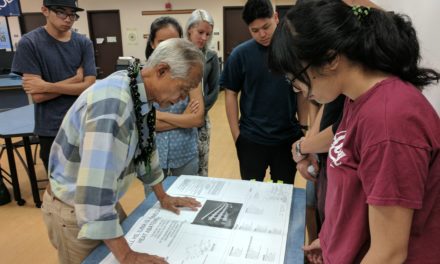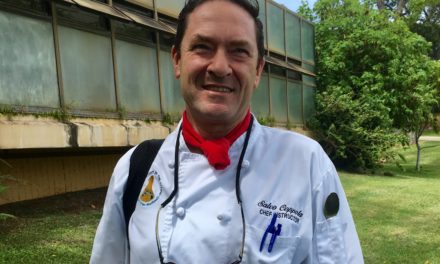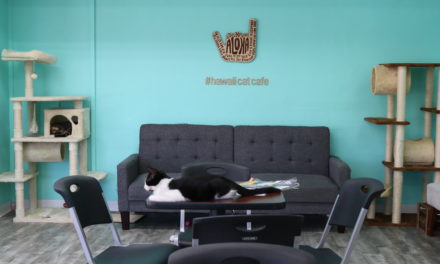By Katlin Cilliers | Staff Writer
Ask a Professor is a regular feature where Kapiʻo News will highlight the real-life careers and jobs that stem from areas of study at Kapiʻolani Community College.
Professor Susan Inouye, who has a doctorate in linguistics from UCLA Los Angeles, has been teaching English and Linguistics at KCC since 1991. She shares her love of the science and offers insights into career options available for those with a degree in the field.
How did you get into the field of linguistics?
In my undergraduate years, I did a concentration in computational linguistics, so I took programming classes and learned [it]. That was before speech synthesis and speech recognition were commonplace. It was right at the beginning of that technology, so that’s where I ended up. I worked for three years for a company called KERZEIL Applied Intelligence, between 1986 and 1989. It was a speech recognition R&D company.
What is computational linguistics?
If you work with computational linguistics you can do A.I. (artificial intelligence), speech synthesis. Also, speech recognition, where you can talk to your phone, so [for example], your Apple watch, Siri listens to you. When I was in that industry, it was really limited. It was used only for medical transcriptions and had limited vocabulary. You had to train [the program] for a specific person, so it would recognize a person and certain words, but it wouldn’t do what Siri does now. That industry is still very vibrant, and linguists are hired to help with that.
What kind of traits do you need to thrive in a career in linguistics?
You must love looking for patterns, being methodical, curious, daring and collaborative, creative. You don’t have to start with a lot of math. You need a natural curiosity for language and other cultures, being open-minded to different people. A lot of people think of linguistics as humanities, but it’s a science. It’s very analytical, left-brained.

Having taught at KCC since 1991, Susan Inouye is passionate about the field of linguistics. (Photo courtesy of Susan Inouye)
What would you say to a student who wishes to pursue a career in linguistics?
To not have blinders on about a certain job; keep their ears and eyes open to how language and linguistic analysis are used in a lot of different places. One of my friends from graduate school was working in marketing, in branding. He was doing research on developing brand names. So “linguistics and marketing,” you might not make that connection. But in linguistics you learn a lot of transferable skills, because it’s a very analytical type of field. Not all linguistics majors are linguists. You can still be a linguist at heart, but your job is something else.
Would a person with qualifications in linguistics be able to work for companies like Apple, Google, and other tech companies?
Yes, and many others. Linguists are involved in other aspects of technology, such as database development, artificial intelligence, and natural language processing. For example, when you write a question in Google, you can say, “How many teaspoons in a cup?” And Google can understand it as a question. Databases didn’t use to work like that. But a lot of the search engines nowadays use language processing in a way that you can use a natural sentence or a question.
Is the linguist involved in developing algorithms? How?
Yeah, as part of a team, they would be developing the grammar, the database accesses and trying to tweak it and make it able to predict how someone is going to finish their sentence, based on a corpus of data. That’s one area, a major [one], where linguistics and technology meet. It’s a really rich area.
What do salaries look like, in that intersection between linguistics and technology?
Programmers, software engineers are being hired anywhere from $60 to $90 thousand a year in an entry-level job. If you combine that with linguistics, it makes you more marketable. With a straight linguistics degree, you might have to do some catching up, so it’s wise to combine it with web technology, programming classes, because you market yourself as being able to hit the ground running, rather than having to learn how to program in language when you get there.
In a job like that, what would the typical day be like?
You’d be part of a project team that is assigned a certain [task, for instance] to take an existing algorithm and customize it for certain applications; or [you may be] part of a team that’s doing research on natural language or vocabulary. Teamwork is essential in any industry, but especially in tech. You’d probably have a project manager giving you pointers, where you’re meeting deadlines, semantic sets of vocabulary that go together. [You’d work on] the statistical probability of what word will come up next, such as when your phone does predictive text. Linguists work on that for sure.
Any other areas that you consider interesting?
Another area is speech pathology. Less high-paid and glamorous than going to work for Google, but important, because [it can help] kids with speech disorders. There’s a major at UH called Speech Pathology and Audiology, which has a linguistics element to it.
[Editor’s note: This interview has been edited for length.]






